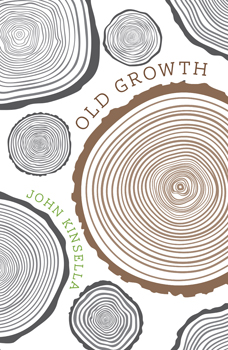Old Growth

Old Growth
In this luminous book of new stories, John Kinsella drops us seamlessly into the worlds of men, women and children at pivotal moments in their lives.
In the title story, a husband who has lost his wife plans to destroy the old-growth bush she loved and escape to the city, with alarming consequences.
Elsewhere, racism at a small town supermarket is resisted through friendship; in an act of kindness a frightening stranger turns up in a family's woodshed; a home-made telephone transmits a dark truth; a theatre director is seduced into the world of an obsessive rabbit trapper; and two sisters find their lives thrown out of kilter by a charismatic junkie.
This is a book of city and country, of challenge and threat, of sobriety and loss of control, but also of hope and beauty. Wandoos hold -the sunset cold and warm at once in their powdery barks' as Kinsella captures the intensity of place, and the complexities and strangeness of human behaviour with wonder and pathos.
John Kinsella's most recent volumes of poetry are Firebreaks (WW Norton 2016) and Drowning in Wheat: Selected Poems (Pam Macmillan, 2016) His collection, Jam Tree Gully (WW Norton, 2012), won the 2013 Prime Minister's Award for Poetry. His volume of stories In the Shade of the Shady Tree (Ohio University Press, 2012) was shortlisted for the Steele Rudd Award. Tide, a collection of stories, was published by Transit Lounge in 2013. Crow's Breath (Transit Lounge, 2015) was shortlisted for WA Premier's Book Awards Fiction Prize 2016 and the Colin Roderick Award 2016. He is a Fellow of Churchill College, Cambridge University, a Professorial Research Fellow at the University of Western Australia, and Professor of Literature and Sustainability at Curtin University.
Old Growth
Transit Lounge Publishing
Author: John Kinsella
ISBN: 9780994395788
RRP: $29.99
Interview with John Kinsella
Question: What inspired the story of Old Growth?
John Kinsella: Seeing someone in the district destroy magnificent old-growth flooded gums and surrounding bushland using the various 'legal' excuses and guises shown in the story. It was horrific, and all the protesting I did against this couldn't stop the fire and destruction. Only today I was looking at the sad residues of these actions " an abomination. The public can see the horror of the destruction of bushland in a place like the city of Perth (the Western Australian government's assault on the Beeliar wetlands happening right now), but fewer people witness the ongoing destruction of remnant bushland in Australian rural areas.
Question: How difficult is it writing many stories?
John Kinsella: I often write stories over long periods. I will start a story and go back to it years later as it resolves itself. So the writing of 'many' stories is relative because they evolve as they can over periods of time. Now, for example, I have four stories that are percolating away and have been doing so for years, but they might all 'realise' themselves rapidly and be finished in a short period of time. Difficulty comes with individual stories rather than in terms of how many might be written for a book, because they all find their own times. I have fertile periods and dormant patches, but in the end the stories determine their own timelines.
Question: Where do you find inspiration for your stories?
John Kinsella: In my surroundings, across the different phases of my life " that is, out of personal experience, and in a lesser sense, from reading. Reading is the most important part of my creative life, but though I am influenced by other story-writing, the stories very much arise out of my interaction with the world, with events, interacting with people, and the natural environment. Issues such as bullying and injustice loom large for me, and are recurring themes, as is the ongoing influence of childhood experience across our lives. But I am also deeply interested in how 'extreme' experiences for an individual, that might seem relatively insignificant to someone else, can be retold to show their intensity. I often do this in a matter-of-fact low-key way. Understatement is useful.
Question: How often does real life serve as your main inspiration?
John Kinsella: Everything I experience goes into my stories, but they come out very different from those experiences. They are not autobiographical stories at all; however, they take experience and transmute it into fiction.
Question: What's next?
John Kinsella: I am working on a new bracket of stories which are starting to find their shape. I have an experimental novel entitled Lucida Intervalla out in the next couple of years with University of Western Australia Press in Australia and Dalkey Archive in the USA.
Interview by Brooke Hunter
Old Growth
Transit Lounge Publishing
Author: John Kinsella
ISBN: 9780994395788
RRP: $29.99
MORE



